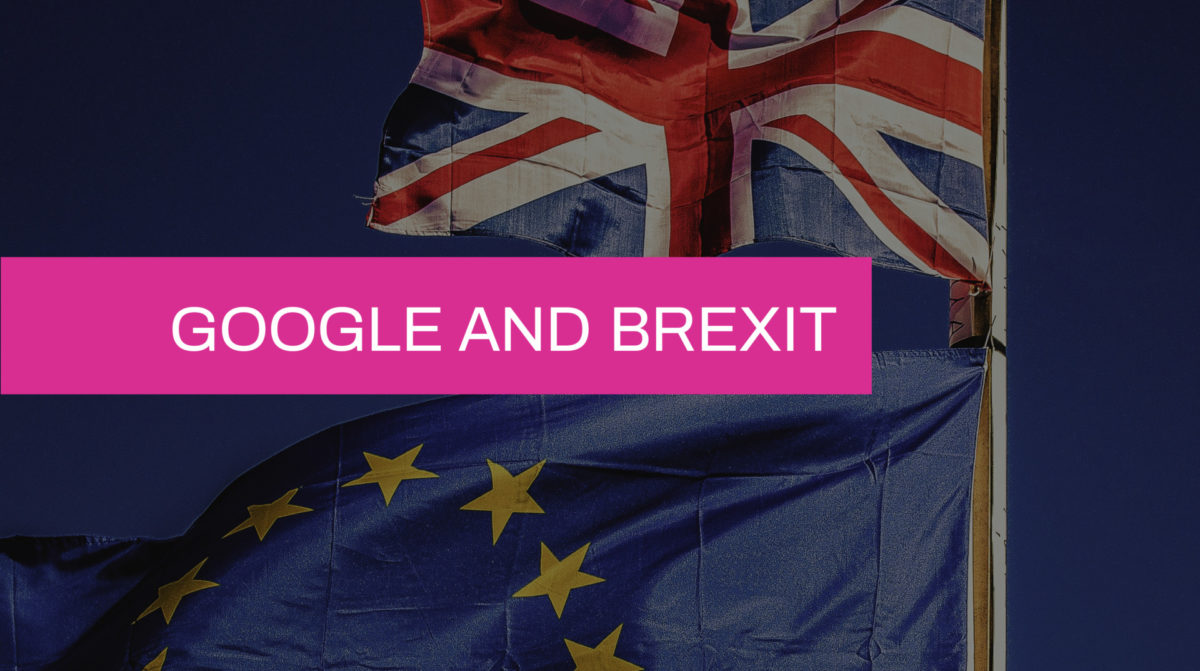So you are probably bored of hearing about it now, but the truth is, Brexit may affect you in ways you hadn’t even thought about, primarily online.
User Data
Google recently announced it would be updating its Terms and Conditions of use, they claim that this is their biggest change to their T’s & C’s since 2012.
We’ve updated our Terms of Service to make them easier for people around the world to read and understand — with clearer language, improved organization, and greater transparency about changes we make to our services and products. We’re not changing the way our products work, or how we collect or process data,”
Google spokesperson Shannon Newberry
Within these new terms was a notice to UK users, notifying them that their user data will be moved from its current location on an Irish/European server to a US server from the 30th of March.
So what does that actually mean?
Well, it means that all the user data that Google collects on you, such as your behaviour, as well as any information it thinks about you, this does not include any personal information such as your name and address that may be found on your Google Account, is going to be moved from the EU jurisdiction to the US.
This user data was originally stored on EU servers and protected by European Laws, however with the UK leaving the European union the data cannot stay where it is.
The data could be moved onto British servers (which it may well be in the future), but at the moment that would require the British government to put in place their own data protection laws, which at the moment is not on the list of priorities. So with very few other options, Google is moving its user data to US Servers.
Now, there are a few people across the internet that are a little worried about this move because US servers are not as secure as their European counterparts, especially for non-US citizens. Right now the UK is in a state of limbo and so is its data. As non-US citizens, our data cannot be taken under US data protection laws and now that we are no longer European, our data cannot be protected by European data protection laws either.
But not to worry.
Google disputes there will be any change in privacy standards for the UK users as a result of the shift. In the meantime, GDPR will still protect our data even on the US servers. (So don’t go removing those GDPR compliance terms from your website just yet).
“Like many companies, we have to prepare for Brexit,” Google said. “Nothing about our services or our approach to privacy will change, including how we collect or process data, and how we respond to law enforcement demands for users’ information. The protections of the UK GDPR will still apply to these users.”
Google spokesperson Shannon Newberry
So you might be wondering, why would Google do anything at all if it’s going to still follow European Law until told otherwise. Well, essentially it was forced to.
British Prime Minister Boris Johnson has made a unilateral statement that the UK will “Go it’s own way” on data protection laws, which is in direct contrast to everything the UK’s data protection regulator and the government has said since the referendum. With this confusing and conflicting statement from the British Government, Google has made it silently know that they do not believe the UK will gain an adequate data protection agreement at the end of the Brexit negotiations. In other words, they are choosing to deal with this now rather than later, as they have little faith in the British Government.
So will we notice the change?
At first and for the foreseeable future? – No. With Google saying there will be no change to the way that they process UK user data, including no change in their privacy setting. Then we can take that as an indication that Google will continue to provide UK users with Europe rights over their data, even though that data is now being held in the US.
So is Google the only one affected?
Well no, literally every online company that holds any information about you is probably going to have to follow suit. This includes the likes of Facebook, Linkedin and many more. The problem is that so far Google is the only one that seems to have done anything about it.
Facebook are the ones with the most to do and so far they seem to be burying their heads in the sand. They have yet to say what they plan to do, with a similar set up to Google in terms of Data collection it is a little worrying that, at the moment, they are refusing to comment, especially when the data they hold on their servers is far more personal than the data Google holds.
With no words from Facebook at this time, we can’t guess what their plans for data protection will be.
We will try to keep you updated with any changes that may appear over the coming days, and if you are worried about your data protection security you could always move over to a browser that does not collect user data such as Duck Duck Go, but with the lack of algorithms such as RankBrain, you may find that your user experience and the search results you get are little – lackluster.

